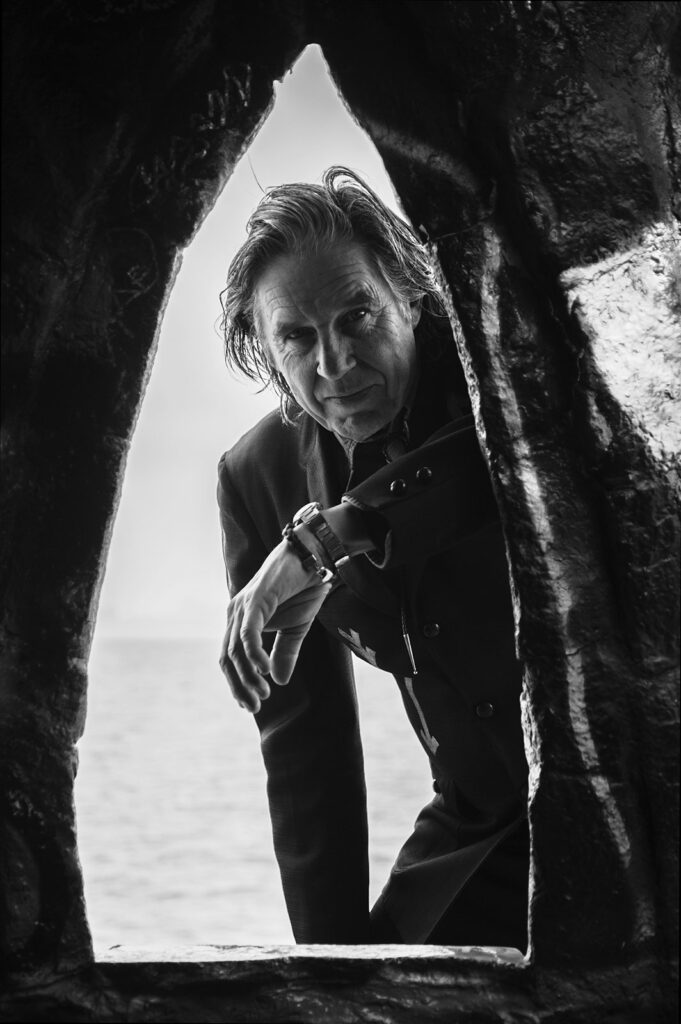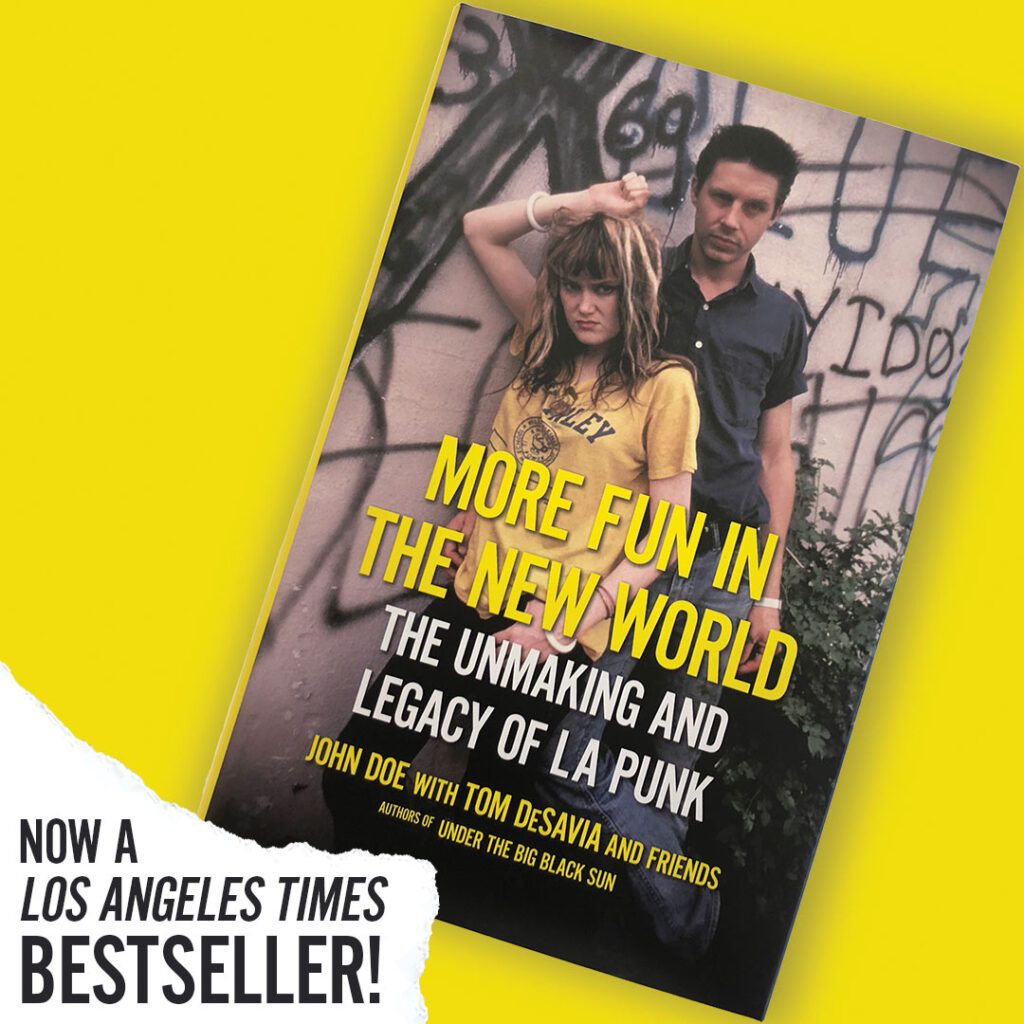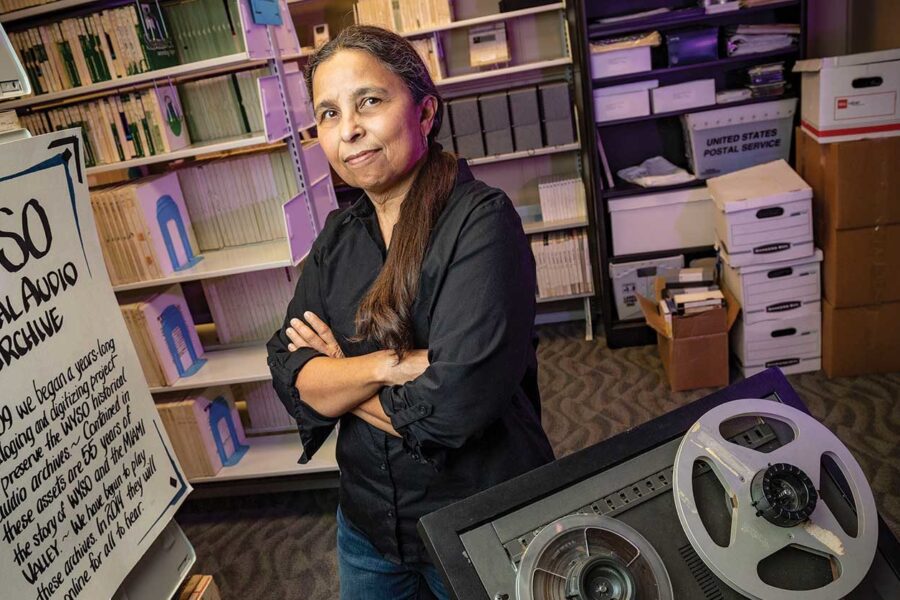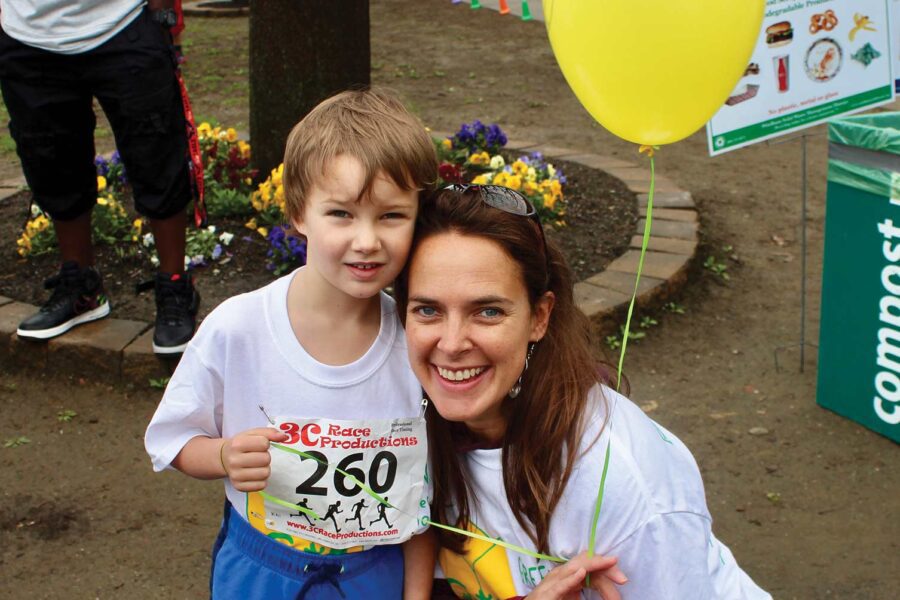When the California quartet X released its first album in 1980, it upended everyone’s assumptions about punk rock. The twin lead vocals from a man and a woman weren’t in unison; instead one kept surging past the other as if they were horses on a racetrack. The racing metaphor was reinforced by the frantic music by the band’s three instrumentalists, who lent a rockabilly swing to the staccato methodology of “fast/hard” punk.
The lyrics were just as unusual; they seldom rhymed and set to music the singers’ Beat poetry inspired by Charles Bukowski. “Tonight you’ll fall asleep in clothes,” they sang on the song “Nausea,” “so late like a candy bar wrapped up for lunch. That’s all you get to taste: poverty and spit.” Even the album’s title, Los Angeles, served notice that punk wouldn’t continue to be dominated by New York and London—other localities were to be heard from.

John Doe ’75 (Antioch Maryland, BA), the group’s male singer, had graduated from Antioch with a double major in poetry and American Literature. He attended the school’s Maryland campuses (in Baltimore and Columbia), and there he worked closely with poet Grace Cavalieri (today the Poet Laureate of Maryland). On the phone from his current home in Austin, Doe credits Cavalieri for giving him the skills and confidence to co-write the lyrics that helped make X so distinctive.
“Antioch played a huge role,” Doe says. “I learned how to listen, how to write. Every time I’m writing anything—songs, poems, books—I think of stuff Grace taught me: how to be truthful, how to get to the core of things, how to know what’s good and what’s not good. Antioch was a tremendous environment, taking those classes at night with young kids mixed in with adults working in hospitals or for the city, having that mix, even though we weren’t all best friends, it felt good, like this was America.”
Doe had dropped out of George Washington University after a year, because he hated “living in a dorm with these poor fuckers who wanted to go to med school and were shitting a brick because they were getting a C in freshman English.” He was living in the Maryland suburbs, pondering his next move when he started attending performances at the Theatre Project, the alternative-theater space launched by Antioch. That made him curious about the school, and he enrolled.
“It all made me understand what a scene was like. I enjoyed that, and I wanted to be part of a music scene when I moved to L.A.”
He not only began one-on-one tutorials with Cavalieri but with his fellow Antioch students also helped launch the Poetry Project, which sponsored workshops and readings at the Theatre Project. Soon he and his friends were regularly driving down to Washington, where poets such as Michael Lally and Terry Winch were leading a vibrant scene of readings.

“Those D.C. poets were creating poetry meant to be spoken out loud,” Doe remembers, “poetry that was irreverent and funny, not fussy and old. That went hand in hand. Baltimore, where John Waters, Fells Point, and the Poetry Project were, just reinforced my desire for a bohemian lifestyle of not giving a shit and living life the way you wanted to. It all made me understand what a scene was like. I enjoyed that, and I wanted to be part of a music scene when I moved to L.A.”
He was still known by his birth name, John Duchac, when his Maryland band moved to L.A. in search of fame and glory. He was soon entranced by the fledgling punk rock scene in southern California, though his bandmates were not. So Duchac set about putting together a new band with a hot-shot guitarist named Stuart Kindell and a bassist named Donald James Bonebrake. In the spirit of the times, they renamed themselves John Doe, Billy Zoom and D.J. Bonebrake.
Meanwhile, Doe was attending the Venice Poetry Workshop, a long-running (and still-running) weekly workshop for poets of all sorts at the Beyond Baroque literary center. Doe was especially struck by one young poet, Christine Cervenka, who was living in the building and studying to become a typesetter. When she joined X, she changed her first name to Exene.
“I could see at once that she was an interesting person,” Doe recalls. “She had an innate ability to listen to that
internal voice and put it on paper. And she had that sense of wordplay that you can’t learn. And she had enough personal experience to write about—her mother passed away early; she had plenty of demons.
“She had a piece called, ‘I’m Coming Over,’ that she would sing. I asked if I could sing it in a band I was starting with Billy Zoom. She said, ‘No, it’s the one thing I have of any value, and I’m not going to give it to you. If anyone’s going to sing it, it’s going to be me.’ And I thought, ‘Well, why not?’ Before I put chords to it, it already had a verse-chorus structure.”
Doe and Cervenka got married in 1980, and the band’s first two albums, Los Angeles and Wild Gift, were produced by Ray Manzarek, the Doors’ legendary organist. X signed with a major label, Elektra Records, in 1982 for its next three albums. But even though the band was showered with critical praise, it never gained much of a foothold on rock radio and thus never made much money. Doe and Cervenka divorced in 1985 (she would later marry actor Viggo Mortensen), and Zoom left the band in 1986 (briefly replaced by the Blasters’ Dave Alvin).
There were two more studio albums in 1987 and 1993 (1987’s See How We Are is probably their best), but the group disbanded in 1998. The original line-up reunited in 2004, however, and has been touring ever since. With the 40th anniversary of Los Angeles due this year, X decided to record a studio album of new songs for the first time in 27 years. Alphabetland was a return to the twin-vocal, careening-speed sound of their debut album and has been warmly received.
After recording eight studio albums with X, two with the Knitters and 13 as a solo artist, after publishing two books about the L.A. music scene, and after acting roles in movies such as Boogie Nights and TV shows such as Roswell, Doe has enjoyed a busy and impressive career. And if Antioch wasn’t the only source of inspiration, it was a major one.
“I owe Grace so much,” he says, “because of her style of teaching. I’ve applied that to every band I’ve been in, to everyone who ever asked me if I liked their song. She always found a positive way to say what was working and what wasn’t working in a poem. She was never afraid to be very sensitive; she was an incredible mentor.”


